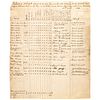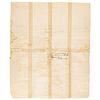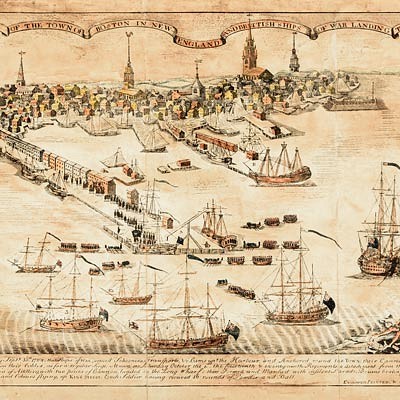War of 1812 British Account of Clothing Issued to American Naval Prisoners Taken
Lot 217
Categories
Estimate:
$1,200 - $1,800
Absentee vs Live bid
Two ways to bid:
- Leave a max absentee bid and the platform will bid on your behalf up to your maximum bid during the live auction.
- Bid live during the auction and your bids will be submitted real-time to the auctioneer.
Bid Increments
| Price | Bid Increment |
|---|---|
| $0 | $10 |
| $200 | $20 |
| $300 | $25 |
| $500 | $50 |
| $1,000 | $100 |
| $2,000 | $200 |
| $3,000 | $250 |
| $5,000 | $500 |
| $10,000 | $1,000 |
| $20,000 | $2,000 |
| $30,000 | $2,500 |
| $50,000 | $5,000 |
| $100,000 | $10,000 |
| $200,000 | $20,000 |
| $300,000 | $25,000 |
| $500,000 | $50,000 |
About Auction
By Early American History Auctions
Mar 20, 2021
Set Reminder
2021-03-20 12:00:00
2021-03-20 12:00:00
America/New_York
Bidsquare
Bidsquare : Autographs-Colonial-Political-Americana
https://www.bidsquare.com/auctions/early-american-history-auctions/autographs-colonial-political-americana-6509
330 Lots of Rare, Historic Autographs, Americana, Civil War Era, George Washington, Abraham Lincoln, Slavery & Black History, Revolutionary War Era, Colonial America, Federal Period, War of 1812, Colonial Currency, Indian Peace Medals & more... Early American History Auctions auctions@earlyamerican.com
330 Lots of Rare, Historic Autographs, Americana, Civil War Era, George Washington, Abraham Lincoln, Slavery & Black History, Revolutionary War Era, Colonial America, Federal Period, War of 1812, Colonial Currency, Indian Peace Medals & more... Early American History Auctions auctions@earlyamerican.com
- Lot Description
War of 1812
Clothing Issued to American Prisoners from the Brig USS Argus War of 1812 British Accounting from Mill Prison
April 18, 1814-Dated War of 1812 Period, Manuscript Document Account of Clothing Issued to American Naval Prisoners from the Brig USS Argus after its Capture by HMS Pelican, Choice Very Fine.
April 18, 1814-Dated Ware of 1812 Period, very rare individualized accounting of clothing issued from Mill Prison Hospital in Plymouth, England to American Prisoners of War who were taken from the Brig USS Argus, its Commander, Master Commandant William Henry Allen, on August 13, 1813 after her defeat at the hands of HMS Pelican and Commander John Fordyce Maple. Document is headed, "Accounts of clothing issued to Sundry Seamen the late belonging to the U. States Brig Argus but now Prisoners of War on board the Brave Prison Ship & in Mill Prison Hospital 18th April 1814". There is a Listing of American Seamen with their signatures listed in one column at center-right. This account measures 12.5" x 15.25" and is recorded on laid period paper with a beautiful large seated Britannia watermark, with text reading "1810". Overall, this is in very nice condition with some slight humidity tone at lower left margin and minor top corner tip chips fully readable well written bold brown text and fold lines reinforced on the blank verso with glassine archival tape. Docket on the verso reads, in full: "Return of clothing issued to Seamen at Plymouth - 16th Aprl. 1814".
The Ship USS Argus had a tremendous American naval history before being taken by the HMS Pelican. It participating in the Blockade of Tripoli and the Capture of Derna during the First Barbary War and then terrorizing British merchant ships, subsequently leading up to her encounter with the HMS Pelican during the War of 1812. The Argus' Commander, Master Commandant William Henry Allen, fought so bravely during the encounter with the Pelican that the British insisted on burying him with full military honors at St. Andrew's Church when he died just a few days after arriving at Mill Prison of his wounds. This is a wonderful piece of American War of 1812 Naval history.
HMS Pelican was an 18-gun Cruizer-class brig-sloop of the Royal Navy, launched in August 1812. She is perhaps best known for her capture in August 1813 of the brig USS Argus. When the navy sold Pelican in 1865 she was the last Cruizer-class vessel still in service.
Pelican was commissioned under Commander John Fordyce Maples on 11 December 1812 for the Irish station. On 5 May 1813 Pelican captured the American schooner Neptune's Barge. Neptune's Barge had been sailing from Connecticut to Santiago de Cuba. Pelican sent her into Jamaica.[3]
Pelican was engaged in convoy escort duty to and from Britain. On 10 August 1813 she arrived in Cork, Ireland, having escorted a convoy from the West Indies. At the time Argus was raiding in British waters and two days later Pelican sailed to join the hunt for the American. On 14 August Pelican engaged Argus off St David's Head on the Pembrokeshire coast. After an engagement lasting 45 minutes Pelican was in a position to board, at which point Argus struck.[4] Pelican had lost two men killed and five wounded; Fordyce estimated American losses as 40 killed and wounded. In 1847 the Admiralty awarded the Naval General Service Medal with clasp "Pelican 14 Augt. 1813" to the four surviving claimants from the action.
Capture of USS Argus:
Later that month Commander Thomas Mansell replaced Maples. On 13 January 1814 Pelican captured the American privateer Siro (or Sero) after a chase of 12 hours. Siro was a schooner out of Baltimore, armed with 12 guns. She had a crew of 50 men under Captain D. Gray. Captain Thomas Mansell described Siro in a letter as being pierced for 16 guns though carrying twelve 9-pounders, and new and a fast sailer. She was only about two years old so the Royal Navy took Siro into service as Atalanta, and even though Pelican had to share the prize money with Castilian, Siro proved to be a valuable prize.
On 26 January Castillian, with Achates in sight, recaptured the Swedish brig Apparencen. Pelican shared the salvage money by agreement with Castillian. Then on 21 March Pelican recaptured Nossa Senhora de Monte and Jupiter. Teazer was in company with Pelican.
Later in 1814, Pelican was in Lisbon. At some point Commander William Bamber replaced Mansell, only to have Commander Thomas Pricket replace him in December.
Our Auction Contents:
Black History & Slavery: (Lots 1 - 63)
Abraham Lincoln Related: (Lots 64 - 74)
Historic Autographs: (Lots 75 - 235)
Colonial America: (Lots 236 - 261)
Revolutionary War: (Lots 262 - 304)
George Washington Related: (Lots 305 - 306)
Early American Guns & Weapons: (Lots 307 - 318) - Shipping Info
-
Early American provides in-house worldwide shipping. Please contact us directly if you have questions about your specific shipping requirements.
-
- Buyer's Premium



 EUR
EUR CAD
CAD AUD
AUD GBP
GBP MXN
MXN HKD
HKD CNY
CNY MYR
MYR SEK
SEK SGD
SGD CHF
CHF THB
THB












